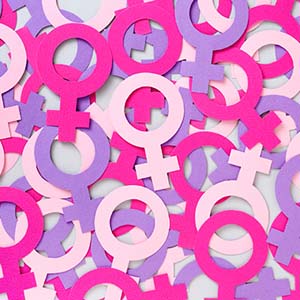There is no denying the popularity of Fifty Shades of Grey. With more than 100 million copies of the book sold and more than $486 million globally since the movie opened February 15, Fifty Shades has catapulted into the public discourse.
And, therefore, into the realm of public health. I have spent years talking to young people, college students, school administrators, youth program staff, and parents about sexual health in this country. So what does it mean that Fifty Shades is now selling bath oil, vibrating love rings, lubricant, and blindfolds at Target? Is this the dawn of improved sexual discourse in the United States? If we have mainstream acceptance of bondage, sexual contracts, and the like, are we going to see an overall improvement in the sexual health and satisfaction of Americans? Or does Fifty Shades just reflect the current state of inequality in the bedroom between men and women? Is it the ultimate elevation of dating abuse, sexual violence, and other gloomy realities about human (hetero)sexual behavior? Unfortunately, I think it is more of the latter.
The first thing that struck me while reading Fifty Shades is this: wow, people are really not kidding about the terrible writing. Just how badly written is the trilogy? It makes the Twilight series—the origin of Fifty Shades, as it was first created as fan fiction—look like Pulitzer material. As Salman Rushdie put it in 2012, “I’ve never read anything so badly written that got published. It made Twilight look like War and Peace.”
Nor is there much new about Fifty Shades, especially sexually. Is there really anything edgy or brave about a dominant man and a naïve girl with big eyes? It is just an R-rated version of a Disney movie.
It is incredibly depressing that badly written erotica acting out very old sexual scripts for women and men has become so popular. People can debate the meanings, symbolism, and impact, and they have (with thanks to the fabulous sexuality educator Aida Manduley for the link—and don’t miss her hilarious live- tweeting of reading Fifty Shades), but the bottom line is that the trilogy’s popularity is a deeply discouraging insight into our current state of sexual health. And frankly, it is not a surprise.
With recent generations raised on abstinence-only, shame-based sexuality “education,” is it any wonder that we now are offered a sexual fantasy that insists on a female character who is clueless, uninitiated, and in fact has never even masturbated? What did we expect the natural progression of abstinence-only would bring us? Don’t forget that the origins of abstinence-only programs moved from preventing teen pregnancy—a worthy and evidence-based public health goal—to promoting heterosexual marriage as the only accepted form of human sexual behavior, an unscientific, moralistic treatise that has proven completely ineffective at changing outcomes. But abstinence-only education has undoubtedly changed our culture. It has brought us more sexual shame, more fear of our desires—particularly female ones—and less knowledge about our bodies and physiology.
Now we have Christian and Anastasia, the bad boy driving an Audi and the good girl driving a beat-up VW Beetle (instead of Edward’s Volvo and Bella’s 1950s Chevy truck in the Twilight series). Christian is bad and knows he is bad, and Anastasia is a literal and figurative virgin, and has to be “taken” in order to allow herself any feelings of genuine sexuality. The consent is flimsy or nonexistent (“Yes,” “No,” “I don’t know,” “Oh okay, take me”); the relentless materialism revolting (for spanking, you get a NEW CAR!); the sex is, frankly, boring (she literally yells “argh” at reaching orgasm. Argh. I tend to use “argh” when I stub my toe); and the message is clear: women who want sex still need to be “taken,” so they don’t have responsibility for their feelings, and men want to dominate and not be touched. I am sorry, but it is 2015, and that is just pathetic. And it is also, unfortunately, the natural conclusion of raising generations of children without genuine, authentic sexuality education. Our desires and sexual scripts are as influenced by our culture as our appetites, our clothing choices, what we listen to, and what we read. Why wouldn’t we expect repression, complete lack of self-knowledge, and a secret room full of naughty things locked away, to become popular and glorified? As Tracy Clark-Flory, sex and relationships writer for Salon, tweeted: “The Fifty Shades movie could not be more clueless about consent, which makes it exactly the sex movie that America deserves.”
We all have work to do to improve our sexual health: increasing communication with our partners; beefing up our birth control; getting tested and treated for sexually transmitted infections; speaking up early and often about the critical importance of active, engaged consent; and working on undoing the shame and misinformation so many of us learned or absorbed growing up in a sexually repressed yet sex-sells-everything, misogynist, homophobic culture. There is so much work to be done. Let us not get distracted by a book or a movie, and instead focus on creating our own genuine and authentic sexual selves. We deserve nothing less.
Sophie Godley (SPH’15), a School of Public Health clinical assistant professor of community health sciences, can be reached at sgodley@bu.edu.
“POV” is an opinion page that provides timely commentaries from students, faculty, and staff on a variety of issues: on-campus, local, state, national, or international. Anyone interested in submitting a piece, which should be about 700 words long, should contact Rich Barlow at barlowr@bu.edu.
















































I do not understand how author Sophie Godley makes the leap from “50 Shades has serious problems” to “abstinence education is to blame.” Clearly proponents of abstinence education support communication and consent as the author does.
Most people agree that sex has a context. The nature of the context may be debated, but most do not have sex in the middle of the street for all their neighbors to see. We all “repress” our sexual desires sometimes, i.e., I don’t have sex with my husband’s best friend even if I find that friend sexually attractive. Does that repression mean that I am somehow ashamed of sex or my body? No. And that “repression” leads to a better sexual relationship with my husband.
I think it is time for proponents of comprehensive sex education to stop shaming people who believe that sex is beautiful and worth sharing with someone who can be trusted. We are not the enemies of healthy sexual relationships. Quite the opposite.
(COM’04)